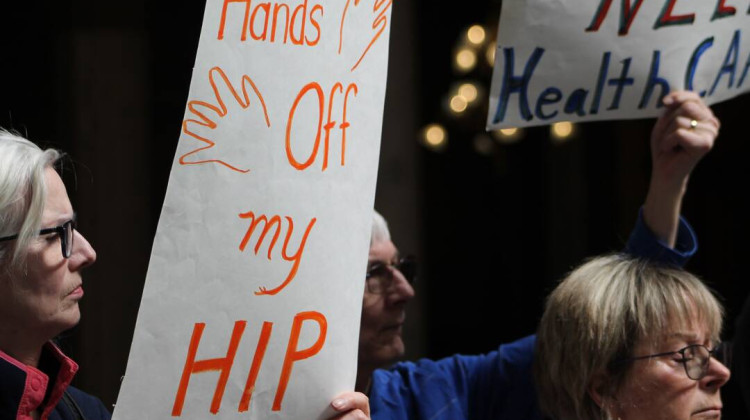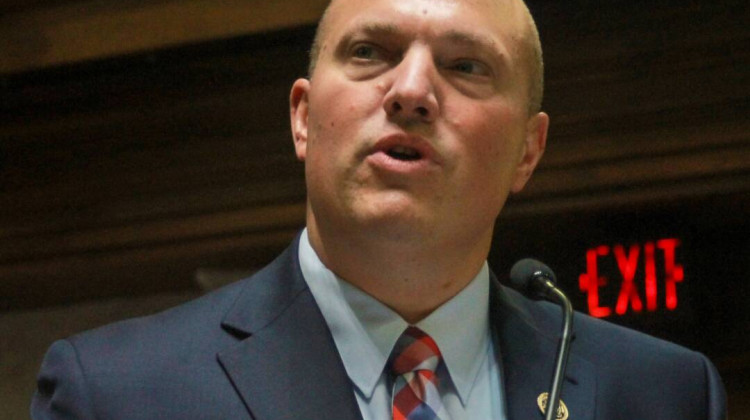
Indiana K-12 schools will not reopen this academic year as the COVID-19 pandemic continues.
Lauren Chapman/IPB NewsThe Indiana State Department of Health reported 13 additional deaths Thursday, bringing the state’s total to 78. The state announced a total of more than 3,000 confirmed cases, with more than 16,000 Hoosiers tested.
K-12 School Buildings Closed For Academic Year
Indiana K-12 schools will not reopen this academic year as the COVID-19 pandemic continues.
The Indiana Department of Education ordered schools Thursday to develop plans to prepare for the long-term fallout from that decision.
State Superintendent of Public Instruction Jennifer McCormick says those “continuous learning plans” will help the state see how schools will continue educating all kindergarteners through high school juniors while buildings remain shut.
READ MORE: Can I Go For A Walk? Here's What A 'Stay-At-Home' Order Really Does
LEE MAS: ¿Puedo Salir A Caminar? Esto Es Lo Que Significa Una Orden De Permanecer En Casa
Indiana is also changing its high school graduation requirements for the class of 2020. McCormick says the requirements for this year’s seniors will be a little more flexible to reflect the current crisis.
“So, if they were enrolled for second semester – and, again, 75 percent of the school year was completed – but for second semester, if they were enrolled in a course, they will get credit,” McCormick says. “They will get the credit … That will be recognized.”
High school seniors will have final graduation exams waived, and they will also receive credit toward receiving their diplomas for courses they’ve enrolled in for the spring semester – as long as they meet the distance learning participation requirements set by their school. They do not have to pass those courses, however.
Indiana Gets A “C” In Social Distancing, According To Cell Data
Data company Unacast created the Social Distancing Scoreboard as part of a pro bono toolkit to help U.S. officials make informed decisions about the coronavirus pandemic.
“The first toolkit element, live today, is a new Social Distancing Scoreboard, which we are making available to help raise awareness of and reinforce the importance of social distancing,” Unacast CEO Thomas Walle wrote in a web post. “We also believe it will not only help make sense of what’s happening now, but unearth trends that will help project scenarios in the short- and mid-term future.”
The company uses cell phone data to track people’s movements.
Monroe County has been one of the best counties in the state at practicing social distancing, according to data from Unacast’s Social Distancing Scoreboard.
Monroe, along with Hamilton and Howard, scored an A-. Indiana as a whole has a current score of C.
Howard County Rolls Back Non-Essential Shopping Rule
Howard County commissioners are pulling back an ordinance they put into effect over the weekend restricting essential businesses from selling non-essential items. This past weekend residents were out of luck if they wanted to purchase games, books, music and other non-essential items locally.
The updated rule now allows people to buy any item, but mandates “one shopper, one cart.”
“The concept of ‘one person, one cart’ is we want people to get in the store and get out as quickly as possible,” says Howard County Commissioner Paul Wyman. “And the retailers want that because they are trying to protect their employees just as much. They want people to get in, get what they need and the concept of one cart is whatever you need, what fits in your cart, get that. Please do not take long shopping excursions. You're trying to focus on what you need and get out.”
All IN: Are Indiana's Hospitals Ready?
We're weeks into the coronavirus pandemic hitting the United States, and Indiana, but every day brings more questions with it. Increasingly, those questions are about hospitals. How many beds, protective masks and other supplies will be needed? And how much worse is it going to get?
All IN talked to leaders from Eskenazi Health about the situation right now, and what they expect for the coming weeks. They talked about what Indiana can learn from other places dealing with the pandemic, and whether our health care system knows just how much to scale up its efforts.
Counties Work To Help Homeless COVID-19 Patients
A facility on Evansville’s north side will become a self-isolation center for people who are homeless with COVID-19.
The city of Evansville and the Catholic Diocese have agreed to allow the city to use the Sarto Retreat House.
In a release, the city said the facility provides a safe, secure place where homeless individuals who have been diagnosed with COVID-19 can be isolated as they wait for their symptoms to dissipate.
It will also house those who have been discharged after being treated for COVID-19 at local healthcare facilities.
South Bend is looking for places to house people who are homeless who have either tested positive for COVID-19 or are showing symptoms.
The goal is to provide a place where people who are sick and facing homelessness can isolate. This will help prevent the further spread of the coronavirus.
City spokesperson Caleb Bauer says officials are looking at a number of sites, including hotels, as possible isolation facilities.
“Obviously this is a unique situation so there are a lot of things to plan for when opening a space like this,” Bauer says.
High Yields, Drop In Ethanol Demand Could Hurt Corn Producers
Agricultural economists forecast a potentially record high year for corn yields at the same time the coronavirus pandemic is hurting industries that rely on the crop. This in turn could hurt prices and farmers.
Feed and ethanol production combined use almost 80 percent of U.S. corn produced.
Sharp declines in gasoline prices and people sheltering in place are causing ethanol plants to shutdown at facilities across the country.
If farmers are able to plant crops on time and see good weather conditions, Purdue University agricultural economist Jim Mintert forecasts there could be 15.8 billion bushels of corn this year. He says the drop in ethanol demand will slash corn prices and ripple through the agricultural community.
Contact Lauren at lchapman@wfyi.org or follow her on Twitter at @laurenechapman_.
This is a rapidly evolving story, and we are working hard to bring you the most up-to-date information. However, we recommend checking the websites of the Centers for Disease Control and Prevention or the Indiana State Department of Health for the most recent numbers of COVID-19 cases.
 DONATE
DONATE





 View More Articles
View More Articles



 Support WFYI. We can't do it without you.
Support WFYI. We can't do it without you.